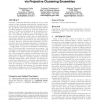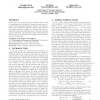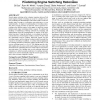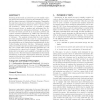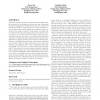102
click to vote
SIGMOD
2011
ACM
14 years 3 months ago
2011
ACM
We study the problem of context-sensitive ranking for document retrieval, where a context is defined as a sub-collection of documents, and is specified by queries provided by do...
143
Voted
SIGMOD
2011
ACM
14 years 3 months ago
2011
ACM
Projective Clustering Ensembles (PCE) are a very recent advance in data clustering research which combines the two powerful tools of clustering ensembles and projective clustering...
102
Voted
SIGIR
2011
ACM
14 years 3 months ago
2011
ACM
In this paper, we propose a joint probabilistic topic model for simultaneously modeling the contents of multi-typed objects of a heterogeneous information network. The intuition b...
97
Voted
SIGIR
2011
ACM
14 years 3 months ago
2011
ACM
Learning to rank represents a category of effective ranking methods for information retrieval. While the primary concern of existing research has been accuracy, learning efficien...
115
Voted
SIGIR
2011
ACM
14 years 3 months ago
2011
ACM
Ranking function performance reached a plateau in 1994. The reason for this is investigated. First the performance of BM25 is measured as the proportion of queries satisfied on th...
110
Voted
SIGIR
2011
ACM
14 years 3 months ago
2011
ACM
Search engine switching is the voluntary transition between Web search engines. Engine switching can occur for a number of reasons, including user dissatisfaction with search resu...
121
click to vote
SIGIR
2011
ACM
14 years 3 months ago
2011
ACM
The assumptions underlying the Probability Ranking Principle (PRP) have led to a number of alternative approaches that cater or compensate for the PRP’s limitations. In this pos...
112
click to vote
SIGIR
2011
ACM
14 years 3 months ago
2011
ACM
Searching is inherently an interactive process usually requiring numerous iterations of querying and assessing in order to find the desired amount of relevant information. Essent...
115
click to vote
SIGIR
2011
ACM
14 years 3 months ago
2011
ACM
The majority of the current information retrieval models weight the query concepts (e.g., terms or phrases) in an unsupervised manner, based solely on the collection statistics. I...
124
click to vote
SIGIR
2011
ACM
14 years 3 months ago
2011
ACM
Versioned textual collections are collections that retain multiple versions of a document as it evolves over time. Important large-scale examples are Wikipedia and the web collect...

